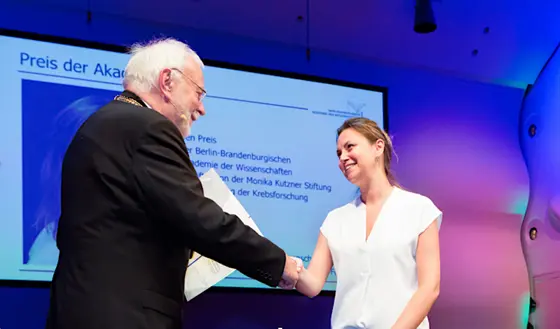“I feel very grateful and honored to receive this prestigious award and I am happy to see research on sarcoma receiving more visibility,“ says Ana Banito. The 38-year-old Portuguese leads a junior group at the KiTZ. Previously, she has worked at the Memorial Sloan Kettering Cancer Center in New York at the Institute of Cancer Researcher Scott Lowe for several years.
Ana Banito is an expert in the biology of soft tissue sarcomas, tumors that can emerge from a variety of tissues of the body. Soft tissue sarcomas account for about seven percent of all childhood and adolescent cancers. They are thus the third most common solid tumors in children and adolescents. Many subspecies of soft tissue sarcomas in children and young adults are based on a common genetic mechanism. Meanwhile, a number of characteristic mutations are known in the genetics of the sarcoma cells that drive the malignant growth of cancer cells.
Banito and her research group genetically mimic these changes in order to better understand the biological processes underlying the development of the disease and to find therapeutic molecules that can stop the tumor growth. The team also explores the role of incorrect regulation of chemical modifications of the genome, the so-called epigenetic modifications, in childhood sarcomas.
The prize of the Berlin-Brandenburg Academy of Sciences and Humanities – donated by the Monika Kutzner Foundation – is endowed with € 10,000. It is awarded for outstanding achievements in the field of cancer research.
An image for this press release is available for download at:
https://www.kitz-heidelberg.de/fileadmin/media/kitz/news/2020/BBAW-Preis-Ana-Banito.jpeg
Caption:
Ana Banito, scientist at the DKFZ and the KITZ, received the award of the Berlin-Brandenburg Academy of Sciences (BBAW) – donated by the Monika Kutzner Foundation – for her work on sarcomas.
Note on use of images related to press releases
Use is free of charge. The German Cancer Research Center (Deutsches Krebsforschungszentrum, DKFZ) permits one-time use in the context of reporting about the topic covered in the press release. Images have to be cited as follows: “Source: Judith Affolter“.
Distribution of images to third parties is not permitted unless prior consent has been obtained from DKFZ's Press Office (phone: ++49-(0)6221 42 2854, E-mail: presse@dkfz.de). Any commercial use is prohibited.



